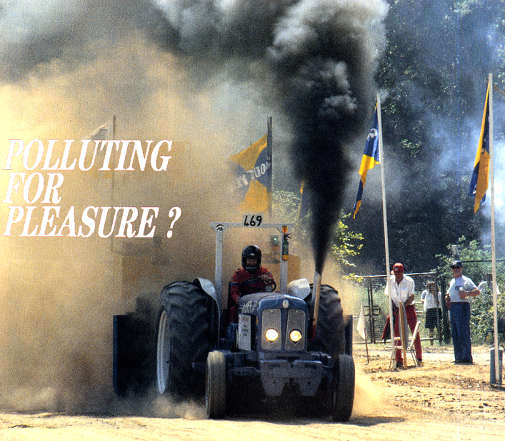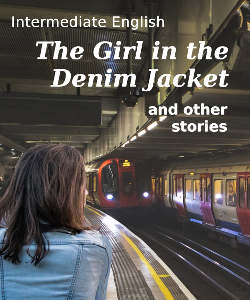Polluting for pleasure ?
POLLUTION, DIRTY RIVERS, THE GREENHOUSE EFFECT, THE OZONE HOLE. Our world is not in very good condition. Some pollution is "necessary", unless we change our way of living. Other types of pollution are not. Simon Lucas asked two British teenagers for their views.

Lucas : Do you think pollution is a bad problem?
JANICE: Yes, of course it is.
MARK: Yes, everyone does, don't they?
Lucas: And what about yourselves? Do you do things that cause pollution?
JANICE: I suppose we all do. But I try not to.
Lucas: How do you try?
JANICE: Well,... I don't waste electricity. I turn off lights; that means less pollution. And I don't use a car very often.
MARK: You haven't got one, have you?
JANICE: No, but we've got one at home, obviously. But I usually go to places on my bike; I don't get my Mum to drive me.
Lucas: What about you Mark?
MARK: Well pollution's a big problem, and we're going to have to change some of the things we do..... but... no one wants to stop doing things, unless everyone does.
Lucas: What things do you mean?
MARK: You know, going out in the car. Popping down town, things like that. And using chemicals and stuff.
Lucas: And what about polluting for pleasure?
JANICE: No-one does that, do they?
Lucas: We all do.
JANICE: Well we shouldn't.... No, that's pretty stupid. I mean, everyone suffers from it.
MARK: What do you mean by polluting for pleasure?
Lucas: Well, the sort of things you've already mentioned,.... like going out in the car. And sport, for instance.
MARK: What kind of sport?
Lucas: All sorts of sport. Look at this picture. (Lucas shows the photo above).
MARK: Oh that's disgusting.
JANICE: That's not sport, is it?
Lucas: Some people think it is! It's called tractor pulling.
MARK: No, that's gross. That really is ridiculous!!
Lucas: But is it different from other kinds of motor sport?
MARK: Well yes, I mean racing cars don't pollute like that, do they?
JANICE: Cars and lorries and things always pollute.
MARK: Yes, but not like that!!
Lucas: O.K. then. So where are you going to draw the line?
JANICE: I don't know....

waste: use more than necessary - obvious: clear, evident - unless: if... not - stuff: things, products - what about: what do you think about? - pretty: quite - gross : horrible - draw the line - fix the limits .
Return to Linguapress site index
Printing: Optimized for printing
Copyright © Linguapress. Do not copy this document to any other website
Student Worksheet
Polluting for Pleasure
Interactive - use on screen or on paperShort answers
Look at this question and answer structure:
Do you do things that cause pollution ? / I suppose I do.
Now give short answers to these questions using the correct auxiliary:
2. Are environment-friendly products more expensive? Yes
3. Do you drive a car? No
4. Do you think pollution is a big problem. Yes
5. Is tractor-pulling different from other sports. Yes
6. Racing cars don't pollute. Oh yes
7. Have you got any good ideas? Yes
8. Are you trying to help the environment? Yes
Rephrasing:
Look at these sentences:
It's stupid to pollute for pleasure. / Polluting for pleasure is stupid.
Now rephrase the following sentences in the same way
It's silly to go by car.
It's much better to go by bicycle
It's easy to waste electricity.
It's fun to learn English with Linguapress..
For
teachers:
Language points:
Pupils should underline all the tag questions (e.g. They don't, do they?) and note the structures.Take care with "No-one does that, do they?" No-one (like everyone) requires a singular verb, but its tag, reflecting a plural notion, requires a plural verb.
Secondly pick out all the expressions that typify spoken, rather than written, language (contractions, fillers, certain words such as stuff, to pop, pretty, etc.)
Have pupils act out the dialogues in class. Pay particular attention to intonation and word stress.
Role Play:
Divide class into groups of three (or four) and have them continue the dialogue in their own words. The extended dialogue could begin with Mark saying: "It's very difficult...." If pupils can't think where to draw the line, then continue on another point.Other ideas?
EFL teachers: Help develop this resource by contributing extra teaching materials or exercises.
To contribute click here for further details
This teaching resource is © copyright Linguapress 1998 - 2025.
Revised 2022. Originally published in Freeway, the Intermediate level English newsmagazine.
Republication on other websites or in print is not authorised.
| Linguapress; home | Découvrez l'Angleterre (en français) | Discover Britain |



